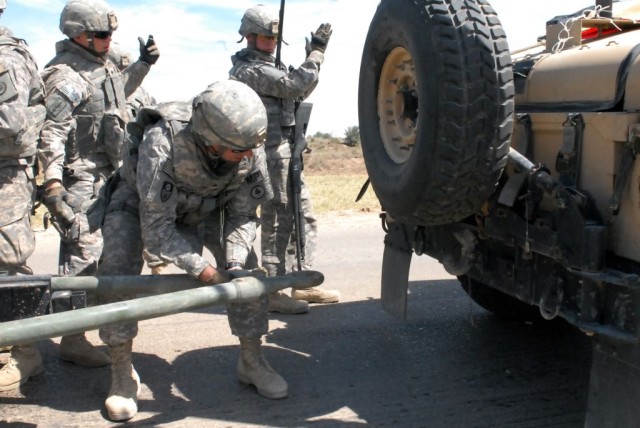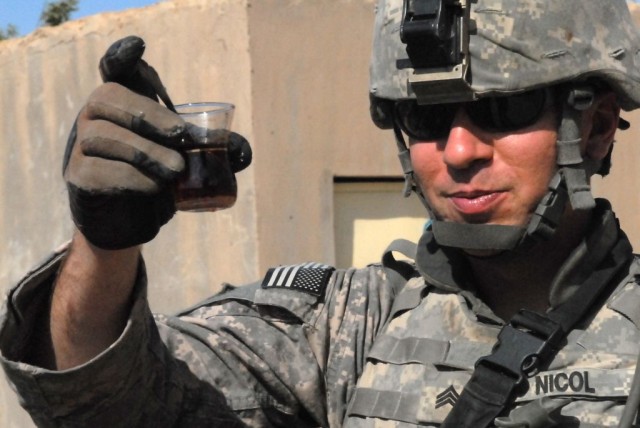The mission wasn't off to the greatest of starts. Fluid leaked out from under the trail humvee's undercarriage and the vehicle's motor would not start.
In a motor pool back in the United States, this isn't a normally a problem. In Iraq, 45 minutes away from any base, it's a problem.
While their platoon mates provided security, military police Soldiers assigned to 252nd Military Police Company, based in Cleveland, Tenn., and currently attached to the 3rd Heavy Brigade Combat Team, 3rd Infantry Division, begin hitching the broken vehicle to a working humvee.
Hooking up the vehicle took a few minutes, but soon everything is secured and the mission continues. All of this was done under the protective shield of a stable local community.
In past deployments, a vehicle breakdown meant scrubbing the mission and getting back to the security of the base.
"The operating environment isn't what it was like a few years ago," said Capt. Darrel T. Hull, the commander of the 252nd MP Company, the next day. "The Iraqi Security Forces know who we are. We have a good relationship with the people in this area. We have had little to no incidents in that area."
Hull, a native of Norris, Tenn., said that his group goes "outside the wire" frequently.
"We have put a lot of miles on these vehicles," he said.
Yet, they are prepared.
"One of the greatest things about the way we do business is the flexibility we have," he said. "We build recovery drills into our run-throughs, so when things like this happen, it doesn't stop us; It may limit some of things we do out there, but it doesn't shut us down."
The convoy continues toward a small village outside of al-Haay. Several weeks earlier, the MP's placed a quick reaction force there overnight. The purpose was to be able to get to al-Haay quickly if their Iraqi Police counter-parts called for help during the Iraqi National Elections.
"The most eventful thing that happened that night was that we buried an MRAP up to its axel in sand trying to get back there," said Sgt. Carlton Walls, a combat medic from Cleveland, Tenn. "The village elder got a backhoe out there and helped dig us out. It was pretty funny. We are taking some supplies back out there to thank them for the help."
The Soldiers are greeted with smiles and warm "American" hellos spoken in a thick Arabic accent. The village children run from Soldier to Soldier asking for candy.
The village elder, an older man in a brown tunic and traditional headdress, asks some men in the village to prepare tea for their guests. It is obvious that they have been here before and are familiar with the people of the village.
Soldiers ask about children who aren't there. They are asked for copies of the pictures they took last time they visited. Everyone seems very familiar with one another.
Members of the MP company finally open the back of their trailer and start giving away heavy-duty trash bags filled with soccer balls, clothes, food and school supplies. They help the villagers carry large boxes filled with bottled water into modest homes.
"When we needed a place to set up for the elections, we didn't just roll in there and take over that area liked we owned it," said Hull. "We approached the village and asked for permission up front. They respect things like that.
"Sometimes it is much easier to bridge cultural differences with basic human kindness. You take off the uniforms, burhkas, dishdashas, and vests and we are all just people," he said. "Common courtesy transcends language a lot of the time."
The village elder is extremely pleased with what has been brought to his people. He attempts to give the Soldiers a sheep in return. After a short debate about how great it would be to have a mascot, the Soldiers respectfully decline. The elder is insistent, however.
"Please tell him we will come back later this week," said Sgt. Jeremy Bankston, a military policeman from Rossville, Ga., to his interpreter. "Ask him if he will cook it for us so we can eat it with everyone here."
This answer seems to please everyone but, before the Soldiers are allowed to leave, tea arrives. All the Soldiers partake in a glass of the piping-hot sweet tea that is such a staple of Iraq. A few are even talked into having two.
"After turning down a goat, I guess we shouldn't say no to chai," jokes Bankston.
Hull saw the offer as a good sign that his company has done a great job in establishing meaningful relationships with the local populace; particularly that village.
"After bringing them things, they felt obligated to give us something in return," explained Hull. "That is how this culture works. A goat is worth about three hundred dollars around here. That isn't something to sneeze at. They were really trying to give us something of value to them. These are poor farmers. I think it shows how much they think of our guys."
Hull, who has deployed before, believes that his unit's current mission has been a meaningful experience for everyone involved.
"We have quite a few older guys and I think our leadership has driven how important relationships are over here," he said. "Our guys just took that and ran with it. They are very aware of the culture and how important the community is over here. They respect it and it has kept us safe over here.""






Social Sharing